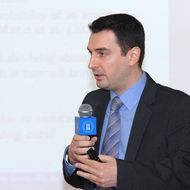- A
- A
- A
- ABC
- ABC
- ABC
- А
- А
- А
- А
- А
- HSE University
- Faculty of Economic Sciences
- Department of Theoretical Economics
- Courses
- Dynamic Stochastic General Equilibrium Models, 2023/24 Academic year
-
Department
109028, Moscow,
Pokrovsky Boulevard 11, Rooms: S1029, S1030
Phone: +7 (495) 772-95-90*27172, 27173, 27174
The Department of Theoretical Economics brings together highly qualified specialists in various fields of economics, including micro and macroeconomics, monetary and financial theory, economic history and the history of economic thought. Our mission is to teach economic disciplines at HSE on the level of leading Western universities.
Dementiev Andrei, Alexandersson G.
Research in Transportation Economics. 2024. Vol. 103. P. 101394.
Olga Demidova, Elena Kayasheva, Artem Demyanenko.
In bk.: Eurasian Business and Economics Perspectives: Proceedings of the 38th Eurasia Business and Economics Society Conference. Vol. 25. Springer Publishing Company, 2023. Ch. 13. P. 209-232.
Tabashnikova D., Sandomirskaia M.
Economics. EC. Высшая школа экономики, 2023. No. 263.
Dynamic Stochastic General Equilibrium Models
- About
- About
- Key Figures & Facts
- Sustainability at HSE University
- Faculties & Departments
- International Partnerships
- Faculty & Staff
- HSE Buildings
- Public Enquiries
- Studies
- Admissions
- Programme Catalogue
- Undergraduate
- Graduate
- Exchange Programmes
- Summer University
- Summer Schools
- Semester in Moscow
- Business Internship
-
https://elearning.hse.ru/en/mooc/
Massive Open Online Courses
-
https://www.hse.ru/en/visual/
HSE Site for the Visually Impaired
-
http://5top100.com/
Russian Academic Excellence Project 5-100
- © HSE University 1993–2024 Contacts Copyright Privacy Policy Site Map
- Edit







Instructor
Mishin, Arsenii
Course Syllabus
Abstract
Learning Objectives
Expected Learning Outcomes
Course Contents
Assessment Elements
Interim Assessment
Bibliography
Recommended Core Bibliography
Recommended Additional Bibliography